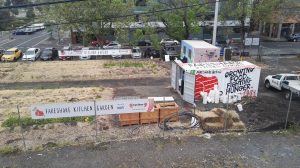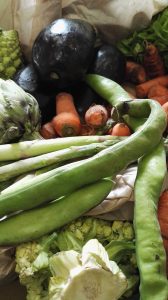SHARECITY’S First Completed Field Site: Food Sharing in Melbourne, Australia
Published by Ferne Edwards on the 20th February 2017.
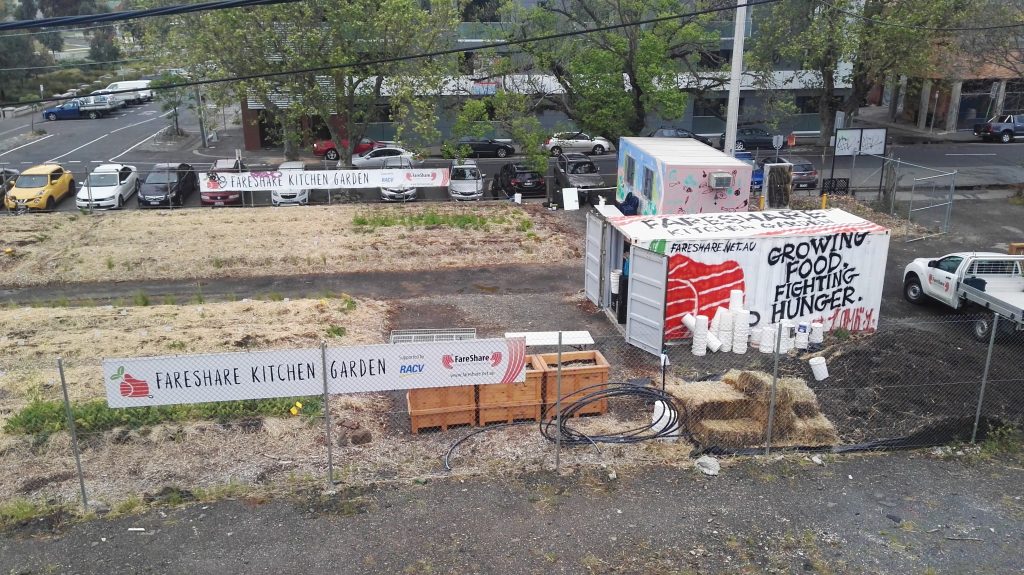
I recently returned from conducting an in-depth ethnography of food sharing activities in Melbourne. Melbourne’s sustainable food movement has a long and rich history, as detailed in the Melbourne SHARECITY profile with Melbourne ranking third in the SHARECITY 100 Database with 144 initiatives. Over a three month period (September to December 2016), I conducted qualitative interviews, focus groups and participant-observation with people engaged in productive, distributive, experiential and ICT-mediated food sharing activities. In addition to gaining perspectives from government and grassroots’ organisations, from the Victorian State Department of Health’s Streatrader initiative, to not-for-profits and commercial enterprises, including Cultivating Community, FareShare, Yume, and the Open Food Network, I also conducted extensive in-depth research with four initiatives: 3000 Acres, Open Table, the Asylum Seeker Resource Centre’s Food Justice Truck, and Ripe Near Me.
3000 Acres is a not-for-profit organisation inspired by the 596 acres project in New York City. Their goal: to “unlock vacant land across Melbourne to grow food and build strong communities”. Through both their participatory online website and face-to-face support, they are unlocking and re-activating spaces across the city, connecting underutilized land from key institutions such as Melbourne Water, VicTrack, local councils and developers, to make land available for local community groups and organisations. 3000 Acres’ online map makes visible three
stages of land access: potential, active and proposed community garden sites.
Open Table is also a not-for-profit organisation that is based on two key ideas: reducing food waste and meeting the neighbours. Open Table receives donated food from food rescue agency Secondbite and local stores that would otherwise go to waste to cook free feasts for everyone. Collaborating with Neighbourhood Houses and supported by the passion and dedication of volunteers, Open Table represents a regular social dining event where everyone is welcome to cook, share stories, or simply enjoy a healthy and tasty meal. Six monthly events are now held across Melbourne (Fitzroy, Carlton, Brunswick, Coburg, Coburg North and Richmond) with more due to open in 2017.
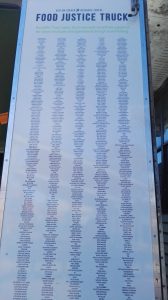 The Food Justice Truck is a social enterprise run by the Asylum Seeker Resource Centre. Recognising that not all people seeking asylum can visit the Centre to receive food support, the Food Justice Truck provides a mobile fresh food market to offer people seeking asylum a 60% discount while selling to the general public at a market rate. Supported by a mammoth crowdsourcing effort to build their beautifully designed food truck, the Food Justice Truck embodies a ‘pay-it-forward’ approach, educates the public about asylum seeker and refugee issues in Australia, and offers an innovative distribution approach to address economic equality. In addition to attending festivals around Melbourne, the Food Justice Truck has three regular sites: the CBD, Thomastown and Dallas.
The Food Justice Truck is a social enterprise run by the Asylum Seeker Resource Centre. Recognising that not all people seeking asylum can visit the Centre to receive food support, the Food Justice Truck provides a mobile fresh food market to offer people seeking asylum a 60% discount while selling to the general public at a market rate. Supported by a mammoth crowdsourcing effort to build their beautifully designed food truck, the Food Justice Truck embodies a ‘pay-it-forward’ approach, educates the public about asylum seeker and refugee issues in Australia, and offers an innovative distribution approach to address economic equality. In addition to attending festivals around Melbourne, the Food Justice Truck has three regular sites: the CBD, Thomastown and Dallas.
Ripe Near Me is an online map that enables people to map their backyard produce and food produced on public land to swap, sell and glean. Their goal: to increase home grown, urban and sustainable foods, to give foodies better access to fresh local produce, to provide more variety, to reduce food waste, and more. Established in 2012 by Alastair and Helena Martin from Adelaide, the national RipeNearMe platform represents one of a cluster of emerging online web initiatives (see the SHARECITY 100 Database to find more) that map produce that would otherwise go to waste.
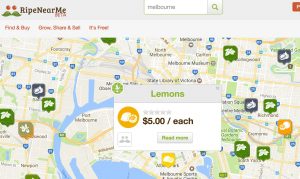 Together, these four case studies represent a range of motivations, locations, and ICT approaches, as shown in the Table below. They share a blend of food skills, spaces, knowledge, produce, and places along the food chain from production through to distribution, consumption and waste. These case studies are representative of recent trends in Melbourne of: pop up gardens and markets, a celebration of cultural diversity and welcoming asylum seekers and refugees through food, and ICT-mediated food sharing social enterprises. Through their actions they add further socio, economic and environmental values to produce, place and person, illustrating how food sharing contributes to so much more than a meal. These case studies also highlight the geographies of potentially disruptive tensions across the city where socio-environmental change is being experienced as rules and regulations are revised to address different scales, locations and actors in emerging urban food sharing practices. Following on from this extensive data collection phase, I am now entering a phase of analysis and dissemination to share Melbourne’s food sharing experiences with the world, before commencing fieldwork in Barcelona, Spain.
Together, these four case studies represent a range of motivations, locations, and ICT approaches, as shown in the Table below. They share a blend of food skills, spaces, knowledge, produce, and places along the food chain from production through to distribution, consumption and waste. These case studies are representative of recent trends in Melbourne of: pop up gardens and markets, a celebration of cultural diversity and welcoming asylum seekers and refugees through food, and ICT-mediated food sharing social enterprises. Through their actions they add further socio, economic and environmental values to produce, place and person, illustrating how food sharing contributes to so much more than a meal. These case studies also highlight the geographies of potentially disruptive tensions across the city where socio-environmental change is being experienced as rules and regulations are revised to address different scales, locations and actors in emerging urban food sharing practices. Following on from this extensive data collection phase, I am now entering a phase of analysis and dissemination to share Melbourne’s food sharing experiences with the world, before commencing fieldwork in Barcelona, Spain.
I would like to thank all the amazing people and organisations who supported and welcomed me throughout my fieldwork. This research would not have been possible without them. While the goals of the organisations each differed, they were each strong and sincere. Even within such a short timeframe of research, it was notable the benefits that food sharing can bring. For more information on the publication outcomes, conference proceedings, and to learn more about other international cities to be researched, please visit the SHARECITY website, the SHARECITY 100 Database, or contact sharecity@tcd.ie or edwardsf@tcd.ie.
© 2015 - 2025 ShareCity | Web Design Agency Webbiz.ie
